

A dissection of Google's Wi-Fi sniffing debacle. A Street View of Private and the Public. Prashant Iyengar on how in the eyes of the law, the internet giant is like the homeless in India.
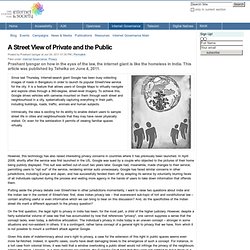
This article was published by Tehelka on June 4, 2011. However, this technology has also raised interesting privacy concerns in countries where it has previously been launched. In April 2008, shortly after the service was first launched in the US, Google was sued by a couple who objected to the pictures of their home being publicly displayed. This suit was settled out-of-court two years later. Google had, meanwhile, made changes to their service, permitting users to "opt out" of the service, rendering similar suits unnecessary. Putting aside the privacy debate over StreetView in other jurisdictions momentarily, I want to raise two questions about India and the Indian law in the context of StreetView: first, does Indian privacy law – that evanescent sub-topic of tort and constitutional law – contain anything useful or even informative which we can bring to bear on this discussion?
Google engeneer identified. Google Staff Knew Of WiFi Snooping, Report Says. 30 April 2012Last updated at 04:17 ET The data was collected by Google's Street View car between 2008 and 2010 The Google engineer who wrote a program that collected personal data from wi-fi networks told at least two other colleagues, a report has revealed.
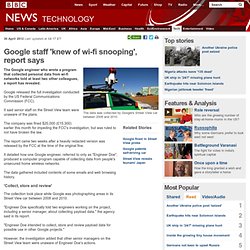
Google released the full investigation conducted by the US Federal Communications Commission (FCC). It said senior staff on the Street View team were unaware of the plans. The company was fined $25,000 (£15,300) earlier this month for impeding the FCC's investigation, but was ruled to not have broken the law. The report came two weeks after a heavily redacted version was released by the FCC at the time of the original fine.
Google Says It Mistakenly Collected Data on Web Usage. Google Inc. said an internal investigation has discovered that the roving vans the company uses to create its online mapping services were mistakenly collecting data about websites people were visiting over wireless networks.
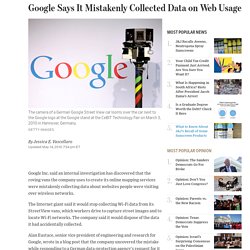
The Internet giant said it would stop collecting Wi-Fi data from its StreetView vans, which workers drive to capture street images and to locate Wi-Fi networks. The company said it would dispose of the data it had accidentally collected. Alan Eustace, senior vice president of engineering and research for Google, wrote in a blog post that the company uncovered the mistake while responding to a German data-protection agency's request for it to audit the Wi-Fi data, amid mounting concerns that Google's practices violated users' privacy.
CNET SV cars grabbed locations of phones,PC' Google SV Switzerland. Google SV South Korea. U.S., European regulators do not share Google Street View concerns. As recently reported by the Washington Post and others, the FTC has ended an inquiry into privacy concerns over Google's Street View service after Google pledged to stop gathering email, passwords, and other information from residential WiFi networks as its Street View cars creep through neighborhoods with computers on and cameras rolling.
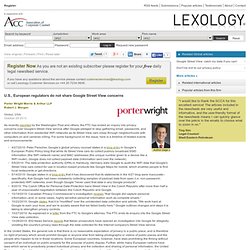
For some background on the issue, here is a timeline of related events and announcements: In the United States, the general rule is that there is no reasonable expectation of privacy in a public place, and is therefore no right of privacy which would prohibit Google or anyone else from taking photographs or videos of public places and the people who happen to be in those locations. Some European countries, however, have laws prohibiting the filming without consent of an individual on public property for the purpose of public display.
Google Explains Its Street View Wi-Fi Gathering Operation - Wi-F. Google's global privacy counsel provides a detailed explanation about what data Street View gathers, including Wi-Fi signal information: As I wrote about last week, Germany's data privacy commissioner raised an alarm at Google scanning and recording data about Wi-Fi networks as it drives around snapping Street View pictures.
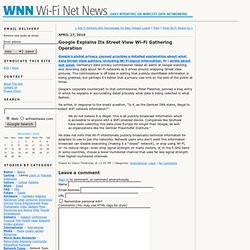
The commissioner is off base in stating that publicly identifiable information is being grabbed, but perhaps it's better that a privacy czar errs on the side of the public at times. Google's corporate counterpart to that commissioner, Peter Fleischer, penned a blog entry in which he explains in excruciating detail precisely what data is being collected in what fashion. He writes, in response to the ersatz question, "Is it, as the German DPA states, illegal to collect WiFi network information? ": We do not believe it is illegal--this is all publicly broadcast information which is accessible to anyone with a WiFi-enabled device. Google letter to lawmakers says "sorry" for Wi-Fi breach, downpl. Submitted: June 11, 2010 - 8:27am Last updated: June 11, 2010 - 8:28am Location: Capitol Building, East Capitol Street, NE and 1st Street, NE, Washington, DC, 20002, United States Google is determined to "learn all the lessons we can" from a major privacy breach in which it may have collected users' personal information from unencrypted Wi-Fi networks, the company said in a letter to House Commerce Committee leaders on June 8.
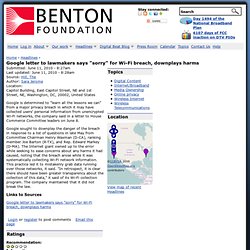
Google sought to downplay the danger of the breach in response to a list of questions in late May from Committee Chairman Henry Waxman (D-CA), ranking member Joe Barton (R-TX), and Rep. Edward Markey (D-MA). Google letter to lawmakers: 'Sorry' for Wi-Fi breach, downplays. Google is determined to "learn all the lessons we can" from a major privacy breach in which it may have collected users' personal information from unencrypted Wi-Fi networks, the company said in a letter to House Energy and Commerce Committee leaders on Wednesday.
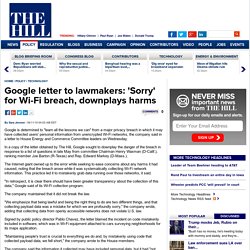
In a copy of the letter obtained by The Hill, Google sought to downplay the danger of the breach in response to a list of questions in late May from committee Chairman Henry Waxman (D-Calif.), ranking member Joe Barton (R-Texas) and Rep. Edward Markey (D-Mass.). The Internet giant owned up to the error while seeking to ease concerns about any harms it had caused, noting that the breach arose while it was systematically collecting Wi-Fi network information. This practice led it to mistakenly grab data running over those networks, it said.
Google SV Italy. Google SV Germany. Google SV France. Google SV UK. Google SV Canada. Google SV Czeck. StreetView passed by Kiwi cops. High performance access to file storage.
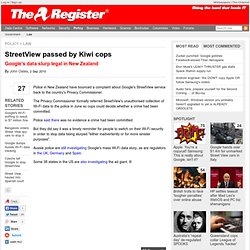
Tech - 'Evil' Eric Schmidt Debuts in Video Targeting Google Privacy - Wired News. Google Street View logs WiFi networks, Mac addresses. Related to: Google Street View Under Fire for Privacy in Germany. Google Street View logs WiFi networks, Mac addresses. High performance access to file storage Google's roving Street View spycam may blur your face, but it's got your number.
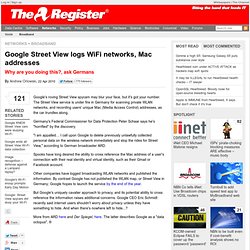
The Street View service is under fire in Germany for scanning private WLAN networks, and recording users' unique Mac (Media Access Control) addresses, as the car trundles along. Germany's Federal Commissioner for Data Protection Peter Schaar says he's "horrified" by the discovery. "I am appalled… I call upon Google to delete previously unlawfully collected personal data on the wireless network immediately and stop the rides for Street View," according to German broadcaster ARD. Spooks have long desired the ability to cross reference the Mac address of a user's connection with their real identity and virtual identity, such as their Gmail or Facebook account. Other companies have logged broadcasting WLAN networks and published the information. More from ARD here and Der Spiegel, here. Google drive-by data scooping: updated. Caparsons's streetview Bookmarks on Delicious.
Street View under fire for Wi-Fi hotspot snooping. By Hani Megerisi Posted on 23 Apr 2010 at 11:15 Google’s Street View car has come under fire collecting data on private Wi-Fi networks.
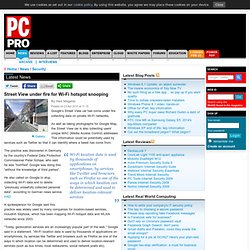
As well as taking photographs for Google Map, the Street View car is also collecting users’ unique MAC (Media Access Control) addresses. This information could be potentially used by services such as Twitter so that it can identify where a tweet has come from. Wi-Fi location data is used by thousands of applications on smartphones, by services like Twitter and browsers such as Firefox as one of the ways in which location can be determined and used to deliver location-relevant services The practice was discovered in Germany by the country’s Federal Data Protection Commissioner Peter Schaar, who said he was “horrified” Google was doing this “without the knowledge of third parties”.
Data collected by Google cars. WiFi networks broadcast information that identifies the network and how that network operates. That includes SSID data (i.e. the network name) and MAC address (a unique number given to a device like a WiFi router). Networks also send information to other computers that are using the network, called payload data, but Google does not collect or store payload data.
Google Says It Mistakenly Collected Data on Web Usage. WiFi data collection: an update. Posted by Alan Eustace, Senior VP, Engineering & Research (cross-posted from the Official Google Blog) Nine days ago the data protection authority (DPA) in Hamburg, Germany asked to audit the WiFi data that our Street View cars collect for use in location-based products like Google Maps for mobile, which enables people to find local restaurants or get directions.
His request prompted us to re-examine everything we have been collecting, and during our review we discovered that a statement made in a blog post on April 27 was incorrect. In that blog post, and in a technical note sent to data protection authorities the same day, we said that while Google did collect publicly broadcast SSID information (the WiFi network name) and MAC addresses (the unique number given to a device like a WiFi router) using Street View cars, we did not collect payload data (information sent over the network). Uncil staff helping selves to data. High performance access to file storage Official claims that "your data is safe with us" suffered another body blow at the weekend with revelations of a dramatic rise in hacking of the UK’s tax and benefit mega-database by council staff. In most cases, councils appear to have concluded that the appropriate penalty for such unlawful prying into personal lives has been nothing more than a slap on the wrist.
The scale of the unofficial snooping came to light following a series of FoI requests by the Mail, which disclosed that there had been 124 security breaches by council staff last year – up sixfold from a mere 20 in 2008/9. Town Hall snoopers have been looking at accounts belonging to friends, family and neighbours – as well as celebrities. Although some 26 employees were dismissed – and eight resigned during the disciplinary process - the majority were let off lightly: 37 received a written or verbal warning, while 43 suffered no penalty at all. We also asked the DWP to comment. Bootnote. On Google Street View Car Logging Wifi Networks... (Google Blogo. Google Wi-Fi Audit Proves Criminal Intent, Says Privacy Group - The results of a third-party audit of Google’s Wi-Fi sniffing code have been released.
The audit shows that the Google software did indeed store unprotected payload data from Wi-Fi networks. This, Privacy International, an advocacy group from the UK, says, is proof that Google had “criminal” intent in collecting the data that it claims is enough for a court to pursue charges against the company. However, Google had already acknowledged all of the findings in the report. Google explains why Street View cars record Wi-Fi data. Google has sent an explanatory letter to the UK's privacy watchdog after it emerged that the company had sniffed and logged the Wi-Fi addresses of citizens across the country. Can privacy, social media and business get along? - Tamar Weinbe. Google Sued for Scooping Up Wi-Fi Data. Newton ISP sues Google over Mass. WiFi customer privacy - Mass H. FastCompany.com - Where ideas and people meet. Privacy in Peril: Lawyers, Nations Clamor for Google Wi-Fi Data.
A hard drive with perhaps several hundred gigabytes of internet surfers’ private data resides under lock and key in a Portland, Oregon, federal courthouse. An open letter to EU privacy commissioners regarding deletion of. Google’s Data Collection Angers European Officials.
Google 2share data with regulators. Google SV patent.